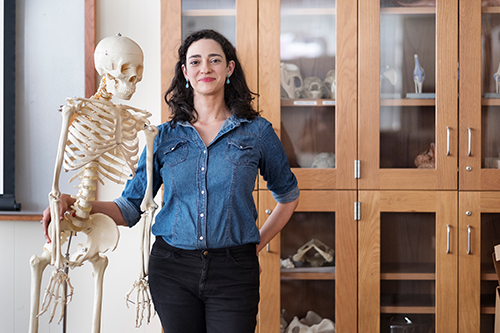NSF grant to study skeletal samples helps MSU anthropologist advance syphilis research
Contact: Sarah Nicholas

STARKVILLE, Miss.—New funding from the National Science Foundation is aiding a Mississippi State biological anthropologist using human skeletal samples to discover more about syphilis. With the goal of helping mitigate the spread of the disease, this current research could provide clinical guidelines for the screening and diagnosis of modern cases.
Molly K. Zuckerman, an associate professor in MSU’s Department of Anthropology and Middle Eastern Cultures, is investigating which characteristics of human hosts—and their immune system responses—led to early resolution of the syphilis infection or were associated with persistence into late-stage infection, which can have serious and sometimes fatal symptoms.
Zuckerman serves as principal investigator for the $260,000 four-year project with colleagues from University of South Carolina and the University of Louisville. Her team is studying more than 300 skeletons from U.S. collections of 19th to early-20th century specimens diagnosed with syphilis prior to death. The researchers are examining how chronic stress, age, health conditions and immune status relate to either recovery from infection or late-stage disease development.
An MSU faculty member since 2011, Zuckerman’s research is focused on the biosocial determinants of health inequalities among past populations, with a particular focus on social identity and gender, and on the evolution of infectious disease. She is active with ongoing bioarcheological research projects in both St. Croix, U.S. Virgin Islands and Mississippi. A native of Pittsburg, Pennsylvania, she received her master’s degree and Ph.D. from Emory University in Atlanta and two bachelor’s degrees from Pennsylvania State University.
A majority of syphilis cases resolve without medical intervention after the early stage of infection, Zuckerman said, but in a substantial minority of cases—15 to 40 percent—the infection persists, damaging the cardiovascular system and causing aortic aneurysms, painful and debilitating damage to the neurological system, paralysis, dementia, destructive tumors and sometimes death.
“Importantly, these cases also typically had very mild early symptoms,” Zuckerman said. “This meant that they weren’t correctly diagnosed with syphilis or didn’t even know that they were sick. As a result, they were not treated. People with untreated syphilis can keep transmitting the infection to their partners, or to their unborn children, causing what is known as congenital syphilis.”
Zuckerman explained that cases of congenital syphilis—which can cause miscarriage, stillbirth, early infant death and lifelong neurological problems—have spiked recently in the U.S., rising almost fourfold in the past seven years.
“This is mostly because of cases of syphilis in pregnant women that were not successfully identified and treated,” Zuckerman said.
“Despite hundreds of years of research on this subject, starting back in the 1700s, scientists still don’t know why some patients immunologically recover from syphilis after initial infection, while others have very mild early infection and then progress to have serious, even deadly symptoms in later stage infection,” she explained.
“The number of reported cases of syphilis has increased two-and-a-half-fold in the past decade in Canada, the U.S. and Western Europe,” said Zuckerman, noting inadequate testing tools are part of the reason.
She expects her research can be translated into clinical tools that will make diagnosing syphilis in modern individuals more effective and accurate.
“Specifically, the project will result in a better understanding of which patients are more likely to have mild early stage infection, and therefore not get diagnosed and successfully treated, and instead, progress to severe late-stage infection. This should lead to improved guidelines for medical professionals for identifying and testing these patients,” Zuckerman said.
As part of the grant, Zuckerman also will create two permanent exhibits in MSU’s Lois Dowdle Cobb Museum of Archaeology, supporting efforts to broaden access to and participation in STEM fields for members of the public and K-12 students in Mississippi.
“These exhibits are based on themes such as how we can use evidence of health and disease in the past to better understand health in modern populations, and how knowledge of past epidemics of infectious disease can improve our response to present-day and future epidemics,” Zuckerman said. “One exhibit will include an educational bioarchaeological ‘dig pit’ for kids that will simulate archaeological excavation using resin models of skeletons and artifacts.”
Alexis Gregory, associate professor in MSU’s College of Architecture, Art and Design, will lead architecture and interior design students in a year-long studio course to design and construct the exhibit space.
“This represents a cross-disciplinary project in which students and faculty from across MSU are coming together to create new infrastructure and new opportunities on campus for K-12 and public engagement, education and outreach,” Zuckerman said.
MSU’s College of Arts and Sciences includes more than 5,200 students, 325 full-time faculty members, nine doctoral programs, 14 master’s programs, and 27 undergraduate academic majors offered in 14 departments. For more details about the College of Arts and Sciences or the Department of Anthropology and Middle Eastern Cultures visit www.cas.msstate.edu or www.amec.msstate.edu.
Mississippi’s leading university, also available online at www.msstate.edu.